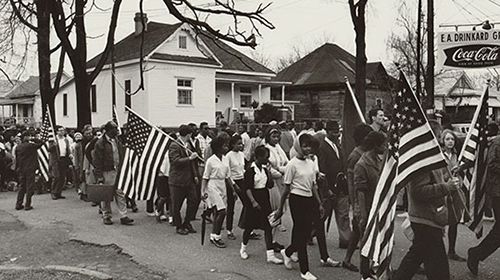
Discrimination in Ferguson works in not-so-mysterious ways.
As the Department of Justice reported, the police disproportionately stop and impose fines on African-American drivers, forcing them into an odious obstacle course that can lead to deep debt or imprisonment. Regardless of whether officers act with intentional or subconscious bias, their actions perpetuate inequality among Ferguson’s residents.
The same holds true for Ferguson-area elections, which will be held tomorrow.
The systematic bias in local elections may not be intentional, but the lived result is no less real. African-Americans have been consistently underrepresented in local government, in part because the electoral system puts African-American voters at an unlawful disadvantage by diluting the power of their vote.
In particular, the ACLU has challenged the Ferguson area’s school board election system as racially discriminatory, charging that the elections are structured to dilute African-Americans’ votes and prevent African-American voters from electing the candidates of their choice.
Here’s how “vote dilution” works when Ferguson residents vote for their school board representatives. Ferguson-Florissant School Board members are elected “at-large,” meaning each of the seven school board seats is elected by the entire district, instead of “single-member,” which would allow voters to elect a representative to a particular seat designated to their neighborhood. As a minority of the voting age population, African-American voters are systematically unable to elect the candidates of their choice because they are a minority with regard to all board seats. If board members were elected using single-member districts, African-American voters would have a majority in some single-member districts and would consistently be able to elect candidates of their choice to seats on the board.
Not surprisingly, the Ferguson-Florissant School Board has had few African American members and is currently comprised of six whites and one African-American, even though many neighborhoods are majority African-American and the student body is 77 percent black.
Zooming out, we can understand how the historic trajectory of discrimination in the Ferguson area created this disadvantage. Explicitly discriminatory laws, such as housing and school segregation, created lasting inequality in access to housing, education, employment, and other resources. Although current laws are facially neutral, and do not expressly differentiate by race, they reinforce historically entrenched patterns of discrimination and perpetuate resource disparities and segregation. Even though discrimination no longer shows up on the face of a statute, in the context of voting and elections, the failure to account for persistent, documented inequity is often discriminatory in and of itself.
Tomorrow, Ferguson’s citizens will go to the poll to vote in local elections. But true representative democracy in Ferguson requires reforming its electoral system to ensure that all citizens’ voices can be heard.


